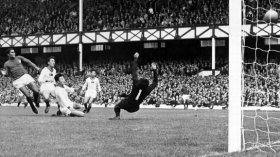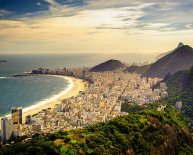
Portugal, Europe
 PARIS - When the final whistle sounded in the moth-ridden Stade de France on Sunday, memories returned to another night in another silent and rapidly emptying stadium: the Stadium of Light in Lisbon in 2004. Then, too, the home team had lost the European Championship in the final. Portugal were the losers in 2004. The team's young winger Cristiano Ronaldo wept on the field. On both occasions, the only goal in a tedious match was scored by a journeyman striker: Angelos Charisteas for Greece in 2004; Eder for Portugal on Sunday.
PARIS - When the final whistle sounded in the moth-ridden Stade de France on Sunday, memories returned to another night in another silent and rapidly emptying stadium: the Stadium of Light in Lisbon in 2004. Then, too, the home team had lost the European Championship in the final. Portugal were the losers in 2004. The team's young winger Cristiano Ronaldo wept on the field. On both occasions, the only goal in a tedious match was scored by a journeyman striker: Angelos Charisteas for Greece in 2004; Eder for Portugal on Sunday.
The Portuguese players and fans in Paris carried the memory of 2004 in their heads. The country's first major trophy is revenge not only for that defeat, but for all Portugal's defeats over the years. It's also the reward the country's unique football culture deserves.
Before Sunday, Portuguese football had a distressing sense of incompleteness, according to the Portuguese author Miguel Lourenco Pereira. He cited the country's great poet, Fernando Pessoa, who wrote "Falta cumprir-se Portugal!" ("Portugal must still complete itself!") The country felt incomplete in its sense of belonging, with connections to Africa and Latin America and on the margins of Europe, but not a full member of any continent. As western Europe's poorest country, it was incomplete in its achievements.
Portugal was incomplete in sports. It has won only four Olympic gold medals in its history and, until Sunday, no international soccer trophies. This was particularly hurtful in a sports-mad country, whose far-right rulers from 1933-1974 encouraged people to seek national pride through soccer. Even today, Portugal's news cycle is dominated by three daily sports newspapers. Unlike France, for example, Portugal breathes soccer.
Cristiano Ronaldo, right, deserved his international title as did his long-suffering nation, Portugal.Over time, many Portuguese fans came to feel that Portugal were doomed to lose; in fact, that foreign conspiracies would always ensure defeat. Eusebio, hitherto considered the greatest Portuguese player ever, always blamed the country's loss to England in the World Cup semifinal of 1966 on a conspiracy. He believed that the organizers had unlawfully moved the match from Goodison Park in Liverpool, where Portugal had come to feel at home, to Wembley, where England had played all its previous games.
"FIFA did a deal with England, " he said to ESPN FC's Gabriele Marcotti decades later. "I looked up to God in heaven and screamed at the top of my lungs: 'What have we done to deserve this?' There was no reply. I knew the answer. We were poor and small. England was rich and powerful, and they were the hosts. And then I cried. I cried a long time."
In fact, Eusebio was wrong: the rules left FIFA free to decide which semifinal would be played at which venue, but it's true this is the kind of decision that tends go in favor of a rich, powerful host nation.
It looked as if Portugal's time had come at Euro 2000. But with only a minute of their semifinal left, Abel Xavier handled a shot on the goal line and Zinedine Zidane converted the penalty to win the match. Xavier later admitted that the ball had touched his hand, though he claimed it was "more a reflex than intentional". Still, the Portuguese cried foul.
In 2002 they did again, but this time with much more justification. They exited the World Cup after the group stage, losing 1-0 to South Korea in a game marked by some bizarre refereeing. Joao Pinto was so angry that he punched the referee after being sent off.
Great Portugal sides like Eusebio's in 1966 provided brilliance but with no glory. This Euro title belongs to them, too.So when Dimitri Payet's early tackle forced Cristiano Ronaldo out of the final after just 25 minutes on Sunday and referee Mark Clattenburg didn't even give a free-kick, the Portuguese had their conspiracy story at the ready. Once again a richer, more powerful nation had conspired with a referee to doom them. And yet, with hindsight, the injury may actually have helped their cause.
Ronaldo had spent most of the tournament standing practically motionless 20 meters ahead of his teammates, barely helping in defense and demanding that every attack culminate with him. His pace and coordination had both declined. He had 45 mostly wasteful attempts on target at Euro 2016; the tournament's second-most prolific shooter, France's Antoine Griezmann, had just 28.
It's true that Ronaldo scored crucial goals against Hungary and Wales (neither of them exactly a giant of football), but after Ricardo Quaresma replaced him in the final, Portugal became a more compact defensive unit. When the French tired towards the end, the Portuguese showed more potent attacking variety.
Nobody will pretend that Portugal had the best team in Europe this summer. The Italians and Germans are both probably stronger. The Portuguese finished third in their weak group and would have been eliminated had the tournament not been unwisely expanded to 24 teams. Eder, Portugal's hero on Sunday, was a goalless flop last season at Swansea and was only just selected to Fernando Santos' 23-man squad.
Indeed, Sunday's winning team was distinctly inferior to the side of Luis Figo, Deco, Maniche and Ronaldo that lost to Greece 12 years ago. And as coach Santos has admitted, Portugal played ugly here. Much as one would like to erase from the mind the image of Pepe vomiting on the field after the final, it sums up the entertainment value of this Portugal side.
But still, their soccer culture has unique strengths. More than any other, it blends Latin American technique with European power and discipline.
Every season, Portuguese clubs receive an influx of young gifted Latin American players who find Portugal to be a home away from home, a comfortable base from which to start their European careers. Many of these players are brought across the ocean by soccer's most powerful agent, Jorge Mendes, whose stable includes Diego Costa, Radamel Falcao, Angel Di Maria and James Rodriguez (plus, of course, Ronaldo).
This Latin influence has shaped Portuguese soccer. Nearly every single player on the team demonstrates a South American comfort on the ball, but they also play with a speed and tactical discipline that the likes of Brazil can only envy.
The best example of Portugal's blend is Pepe, probably the team's most important player at Euro 2016: The crunching centre-back raised in northeastern Brazil is always in the right position, winning almost every tackle but also blessed with the technique to move play instantly forward with inch-perfect, 30-meter passes.
Born on the Portuguese island of Madeira, the outpost of Europe closest to Latin America, Ronaldo also blends both continents. Like Luis Figo, he is a mix of Latin American dribbler and European power forward, the type of player no other European country produces.
The Portuguese deserved to win Euro 2016 not because their current team is so wonderful, but as a recompense for all their great teams of the past. Much the same goes for Ronaldo: he is no longer the player he was, but over his entire career he merits a prize with Portugal, a bit like an Oscar for lifetime achievement.
Laszlo Boloni, the Hungarian coach who discovered Ronaldo for Sporting Lisbon, said before the final that if Portugal won, he would surpass Eusebio and Figo in Portuguese soccer history. That has now happened. And in January of next year, Ronaldo should collect his fourth (and probably last) Golden Ball as football's player of the year. A poor country of just 10 million people has produced the most prominent agent, coach and European player of our era.

















